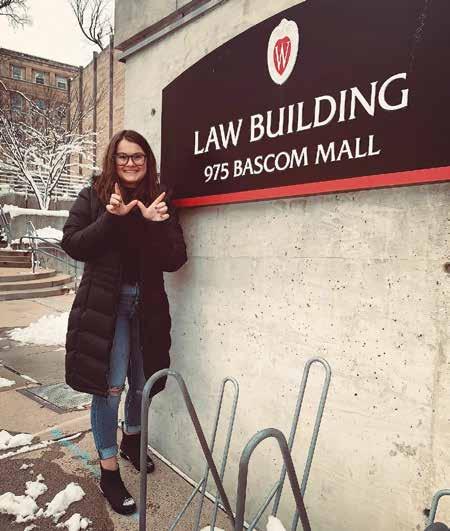
4 minute read
From hockey to law, powerhouse college student embraces all opportunities
By Andrea Busche
At just 21 years old, Amber Heidenreich has her whole life ahead of her. Yet, she has realized all of her goals thus far, making her seem more mature than her age.
For instance, Heidenreich is an accomplished athlete. She has been a hockey phenom since childhood. Her impressive hockey skills, in fact, led to her college recruitment. She is also a track and field star, and one of the University of Wisconsin-Superior’s reigning conference champions.
Additionally, her resume of civic duties and associations is vast. She is on the cusp of graduating college and has already been accepted into law school.
Heidenreich believes in taking advantage of every chance life has to offer. When opportunity knocks, her answer is always a resounding “yes.”
‘As soon as I could walk, I was skating’
Heidenreich was born in Pomona, California. She moved to Phillips, Wisconsin, with her parents and brother, Luke, when she was an infant.
Sports were an early passion for Heidenreich. But it all started with ice skating.
“As soon as I could walk, I was skating,” she said. “Every kid I knew was skating. We lived across the road from a lake, and my dad would plow off a section for us to skate. We’d often go to an outdoor rink, too.”
But her interests quickly expanded to encompass other sports, too.
“Growing up, I played every sport that I could — baseball, soccer, volleyball and track. But hockey was more of my niche. I’ve been playing hockey year-round since age 8.”
At age 12, Heidenreich was recruited to play hockey at Marshall School in Duluth. She lived with a host family for two years. After that program’s eventual closure, she was recruited yet again — this time to Hayward, Wisconsin.
From ages 14-18, she lived with another host family in Hayward while she played hockey. While in high school, she also played hockey for Team Wisconsin, a Tier 1 team. She also became a competitive track and field athlete. Ultimately, Heidenreich graduated from Hayward High School.
College
When it came time for college, Heidenreich was recruited to UW-Superior, again for her hockey prowess. But her studies and other affiliations have also been very important to her.
Heidenreich is currently a senior at UW-Superior, doublemajoring in legal studies and political science.
“I’ve wanted to be a lawyer since I was in high school,” she said. “I want to advocate for others, and give them the voice they don’t necessarily have.”
Heidenreich has been a starting player on the UW-Superior women’s hockey team for her entire college career. Additionally, she is the University’s conference champion for pole vaulting.
Her other associations are vast. She is the president of the Criminal Justice Honor Society and has been a member since her sophomore year. She is a member of the Pre-Law Society, where she has formed helpful connections with other students pursuing careers in law. She also belongs to the Newman Civic Fellowship, a collaborative, nationwide group which recognizes and supports community-minded students.
And, she has worked for the South St. Louis County DWI Court Program, established by now former Judge Shaun Floerke. Here, she helped with chemical use assessments and recommended resources to people who are in drug and alcohol treatment.
Heidenreich has also worked a variety of jobs to help pay for her tuition. Throughout college, she has held jobs in food service and retail, and has done research projects and internships through UW-Superior.
Law school
Heidenreich recently learned that she was accepted into law school at the University of Wisconsin-Madison, the city where her parents currently live. Once she and her cat, Princess Mittens, make the move from their off-campus rental home to Madison later this year, she will live with her parents for the first time since she was 12. The entire family looks forward to the reunion.
Madison is a special place for the Heidenreich family.
“My dad also went to college at Madison, and I grew up watching Badger games,” she said.

Heidenreich has ambitious plans to start her career as an attorney and eventually become a judge.
Hobbies
When she isn’t busy with school and civic duties, Heidenreich enjoys outdoor activities.
“I love skating and also hiking, particularly at state parks. I just like being outside,” she said.
“I also like to water ski,” she added. “My family has a cabin on the Mississippi River where I like to ski and ride in the pontoon boat.” Heidenreich also enjoys reading.
Advice
Looking back at her first 21 years, Heidenreich has learned to accept every opportunity life has to offer.
“If someone has an opportunity for you, say yes to everything you can: jobs, internships and research opportunities,” she said. “It’s also important to form good relationships with everyone —- from your instructors to other professionals.”
But if there’s one thing she is working on, it’s to become a bit less competitive, and a bit more collaborative.
“I just took an emotional intelligence class, and it really opened my eyes to a lot of things,” she said. “I’ve always seen a lot of things as a competition. I’ve maintained a 4.0 GPA throughout high school and college. Going forward, I want to focus more on working with everyone. Not everything has to be a competition. I want to be more collaborative and empathetic.” D
By Amy Kuronen
“What, exactly, is a trust? And why would I need or want to have a trust?”
I am frequently asked these questions in my role as an attorney working as a trust officer for a corporate trustee. Let’s demystify trusts this month!
What is a trust?
A trust is a legal entity, created by an agreement, to own financial assets and property, manage those holdings, and distribute funds, all in accordance with the wishes of the person who establishes the trust. That person is known as the “grantor” or “settlor.” Other parties to a trust include the trustee and the beneficiary(ies). The trustee manages the trust assets and administers the trust. The trustee has the legal duty to always act in a fiduciary manner, or in the best interests of the beneficiaries. The beneficiary is the person who may receive distributions from the trust.
It is interesting to note that one person — you! — may serve in all three roles. Often, the grantor serves as his/ her own trustee, and the trust assets are used for the grantor’s own benefit. The trust agreement designates a successor trustee — which may be another person or an institution such as a bank — to step in should the grantor become incapacitated and/or following the grantor’s death.








